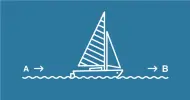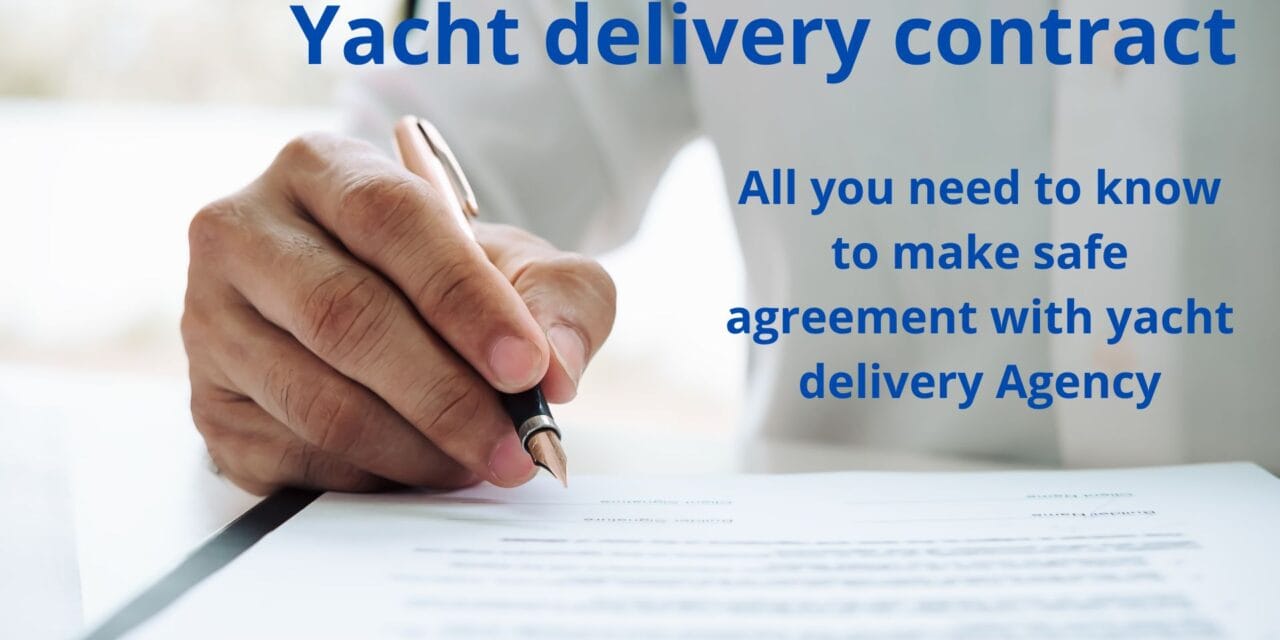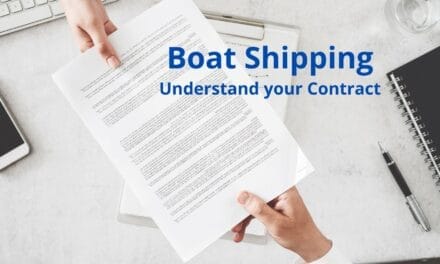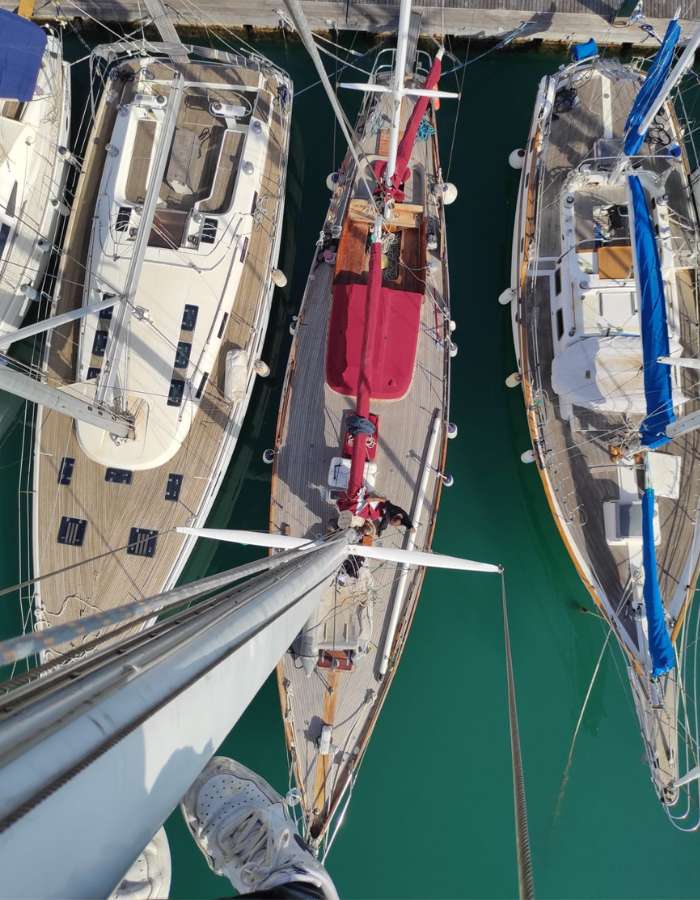Understanding the Yacht Delivery Contract: A Guide for Yacht Owners
When entrusting your prized yacht to a delivery company, it’s essential to understand the details of the skipper delivery contract. This agreement is not just a formality—it’s a crucial document that outlines the responsibilities, expectations, and protections for both you and the delivery company. As an experienced yacht delivery skipper and lawyer, I’d like to guide you through the typical yacht delivery agreement, ensuring you have the knowledge to make informed decisions and feel confident throughout the process.
Introduction
The open sea offers endless possibilities, but when it comes to moving your yacht from one location to another without sailing it yourself, hiring a professional delivery service becomes invaluable. A well-drafted skipper delivery contract ensures that your vessel is transported safely, efficiently, and in accordance with all legal requirements.
This guide aims to help you, as a yacht owner, understand the key components of a typical yacht delivery agreement. We’ll delve into each section of the contract, explain its significance, and highlight what you should look for before signing on the dotted line.
Understanding Yacht Delivery Contracts
Definition and Purpose
A yacht delivery contract is a legally binding agreement between the yacht owner (you) and the yacht delivery company. It outlines the terms and conditions under which the delivery company will transport your vessel from the point of origin to the specified destination.
Key Parties Involved
- Yacht Owner (Customer): The individual or entity that owns the yacht and seeks delivery services.
- Yacht Delivery Company: A professional service provider specializing in transporting yachts.
- Skipper and Crew: The licensed captain (skipper) and any additional crew members responsible for the actual delivery.
Key Elements of a Skipper Delivery Contract
Understanding each element of the contract ensures that both parties have clear expectations and legal protections.
1. Scope of Services
Description of Delivery Services:
The contract should clearly state the nature of the services provided. This includes:
- Type of Delivery: Whether the yacht will be sailed to the destination, transported via cargo ship, or moved overland.
- Route Planning and Navigation: Details about the planned route, including any stopovers or ports of call.
Example Clause:
“The Delivery Company agrees to sail the Yacht from Marina del Rey, California, to Honolulu, Hawaii, following the agreed-upon route, subject to necessary adjustments due to weather or safety considerations.”
2. Responsibilities of the Skipper and Delivery Company
Safe Delivery of the Yacht:
- Ensuring the vessel arrives at the destination in the same condition as when it was handed over.
- Maintaining professional standards of seamanship.
Compliance with Maritime Laws and Regulations:
- Adhering to international, national, and local laws.
- Observing environmental regulations and safety protocols.
Crew Management:
- Providing qualified crew members.
- Managing crew conduct and welfare during the voyage.
Example Clause:
“The Skipper shall exercise due diligence to safely navigate the Yacht and comply with all applicable maritime laws and regulations.”
3. Responsibilities of the Yacht Owner
Providing a Seaworthy Vessel:
- Ensuring the yacht is in suitable condition for the voyage.
- Addressing any maintenance or repair issues before departure.
Insurance Coverage:
- Maintaining comprehensive insurance for the yacht, including hull and machinery insurance.
- Providing proof of insurance to the delivery company.
Necessary Documentation:
- Supplying all required documents, such as registration, permits, and customs paperwork.
Example Clause:
“The Owner warrants that the Yacht is seaworthy and will provide all necessary documentation and insurance prior to delivery commencement.”
4. Payment Terms
Fees and Expenses:
- Fixed Fees: Agreed-upon cost for the delivery service.
- Variable Expenses: Costs such as fuel, port fees, provisioning, which may be billed separately.
Payment Schedule:
- Deposit: A percentage of the total fee paid upfront.
- Final Payment: Remaining balance upon completion or according to milestones.
Additional Costs:
- Clarification on who is responsible for unexpected expenses.
Example Clause:
“The Owner agrees to pay a fixed fee of $10,000, with a 30% deposit due upon contract signing and the remaining balance payable upon delivery. Additional expenses, including fuel and port fees, shall be reimbursed upon presentation of receipts.”
Table 1: Typical Payment Schedule
| Payment Stage | Percentage | Amount |
|---|---|---|
| Deposit | 30% | $3,000 |
| Final Payment | 70% | $7,000 |
| Total | 100% | $10,000 |
5. Insurance and Liability
Liability of the Skipper and Delivery Company:
- Defines the extent of the delivery company’s responsibility for loss or damage.
- May include limitations on liability.
Insurance Requirements:
- Details about the insurance policies each party must hold.
- May require the delivery company to have professional indemnity insurance.
Example Clause:
“The Delivery Company shall not be liable for loss or damage arising from perils of the sea, except in cases of gross negligence or willful misconduct. The Owner shall maintain insurance covering such risks.”
6. Time Frame and Delivery Schedule
Estimated Departure and Arrival Dates:
- Specifies the planned timeline for the delivery.
Factors Affecting Schedule:
- Acknowledges that weather, mechanical issues, or unforeseen events may impact timing.
Example Clause:
“The Yacht is scheduled to depart on May 1, 2023, with an estimated arrival date of May 20, 2023, subject to weather conditions and other factors beyond the Delivery Company’s control.”
7. Termination Clause
Conditions for Termination:
- Outlines circumstances under which either party may terminate the contract.
Consequences of Termination:
- Details regarding refunds, payments due, or penalties.
Example Clause:
“Either party may terminate this Agreement with written notice if the other party breaches a material term. In the event of termination by the Owner without cause, the deposit shall be non-refundable.”
8. Force Majeure
Definition:
- Identifies events beyond the control of either party (e.g., natural disasters, war).
Impact on Obligations:
- Specifies that obligations may be suspended or adjusted during such events.
Example Clause:
“Neither party shall be liable for delays or failures in performance resulting from force majeure events, including but not limited to hurricanes, earthquakes, or government actions.”
9. Dispute Resolution
Governing Law:
- States which country’s laws will govern the contract.
Arbitration or Mediation Clauses:
- Provides methods for resolving disputes outside of court.
Example Clause:
“This Agreement shall be governed by the laws of the State of Florida. Any disputes shall be resolved through binding arbitration under the rules of the American Arbitration Association.”
10. Confidentiality and Non-Disclosure
Protection of Owner’s Privacy and Vessel Information:
- Ensures that sensitive information is not disclosed to third parties.
Example Clause:
“The Delivery Company agrees to keep all information regarding the Owner and the Yacht confidential and shall not disclose such information without the Owner’s prior written consent.”
Additional Clauses to Consider
Condition of the Vessel
Pre-Delivery Inspection:
- Conducted by the skipper to assess the yacht’s condition.
Repairs and Maintenance:
- Agreement on who is responsible for necessary repairs discovered before or during the voyage.
Example Clause:
“Prior to departure, the Skipper will perform a thorough inspection. Any required repairs shall be addressed by the Owner before commencement.”
Equipment and Inventory
List of Onboard Equipment:
- An inventory of items included with the yacht.
Responsibility for Loss or Damage:
- Clarifies liability for equipment during the delivery.
Example Clause:
“An inventory of all equipment shall be documented and agreed upon. The Delivery Company is responsible for any loss or damage due to negligence.”
Communication During Delivery
Regular Updates to the Owner:
- Frequency and method of communication (e.g., daily emails, satellite phone calls).
Emergency Contact Procedures:
- Protocols for urgent situations.
Example Clause:
“The Skipper will provide the Owner with daily updates via email and notify immediately of any significant issues.”
Environmental Considerations
Compliance with Environmental Laws:
- Commitment to adhering to regulations regarding pollution and waste disposal.
Waste Management Policies:
- Procedures for handling garbage, sewage, and hazardous materials.
Example Clause:
“The Delivery Company shall comply with all environmental laws and ensure proper waste management practices are followed throughout the voyage.”
Tips for Yacht Owners Reviewing a Delivery Contract
- Read the Entire Contract Carefully:
- Ensure you understand every clause.
- Don’t hesitate to ask for clarifications.
- Verify Insurance Coverage:
- Confirm that both you and the delivery company have adequate insurance.
- Request copies of insurance certificates.
- Check Qualifications:
- Ensure the skipper and crew are properly licensed and experienced.
- Clarify Payment Terms:
- Understand all fees and potential additional costs.
- Be aware of payment schedules and penalties for late payments.
- Understand Liability and Indemnification:
- Know what you’re responsible for and what the delivery company covers.
- Seek Legal Advice:
- Consider having a maritime lawyer review the contract.
- Communication Expectations:
- Agree on how and when updates will be provided.
- Termination Conditions:
- Be clear on how to exit the agreement if necessary.
- Ensure Environmental Compliance:
- Protect yourself from potential legal issues related to environmental regulations.
- Maintain Open Communication:
- Establish a good rapport with the delivery company for a smoother process.
List: Questions to Ask the Delivery Company
- What is your experience with deliveries on this route?
- Can you provide references from previous clients?
- What qualifications do your skippers and crew hold?
- How do you handle unexpected delays or mechanical issues?
- What is your policy on fuel and other variable expenses?
Conclusion
A skipper delivery contract is a vital document that safeguards both you and the yacht delivery company. By understanding each element of the agreement, you can ensure that your yacht is in trusted hands and that the delivery process aligns with your expectations.
Remember, open communication and due diligence are key. Don’t hesitate to discuss any concerns with the delivery company and seek professional advice when needed. Your yacht is a significant investment, and taking the time to thoroughly review and understand the delivery contract is a crucial step in protecting that investment.
Disclaimer: This guide provides general information and is not a substitute for professional legal advice. Consult with a qualified attorney for advice specific to your situation.
Citations:
- Maritime Law Handbook by Paul Todd
- International Convention for the Safety of Life at Sea (SOLAS)
- Standard Terms and Conditions for Yacht Delivery by the Professional Yachtsmen’s Association
Table 2: Comparison of Owner and Delivery Company Responsibilities
| Aspect | Yacht Owner | Delivery Company |
|---|---|---|
| Vessel Condition | Ensure seaworthiness | Conduct pre-delivery inspection |
| Insurance | Provide hull and machinery insurance | Maintain professional liability |
| Documentation | Supply necessary legal documents | Comply with regulatory reporting |
| Payment | Pay agreed fees and expenses | Provide transparent billing |
| Communication | Provide contact information | Regular updates during delivery |
| Environmental Compliance | Ensure vessel meets standards | Adhere to waste management policies |
| Termination | Follow contract terms | Adhere to termination clauses |
Final Thoughts
Entrusting your yacht to a delivery service is a significant decision. A well-crafted skipper delivery contract provides peace of mind by clearly outlining the duties and expectations of all parties involved. By taking the time to understand the contract thoroughly, you can embark on this partnership with confidence, knowing that your vessel will be delivered safely and professionally.
If you have any questions or need assistance with yacht delivery services, our team is here to help. We bring extensive experience and a commitment to excellence in every delivery we undertake.
Safe voyages and fair winds!








